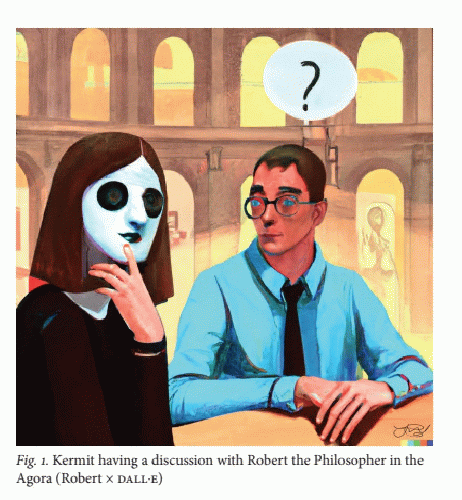The following edited Zoom interview took place on March 04, 2023.
######
Hawkins:
The first question is obvious. What does the title of your new book, Exoanthropology, mean? We all know that anthropology means the study of humans and their cultures. When we think of "exo," we may think of exoskeleton. But what does your word mean and how do you apply it?
Leib:
In the title, the word exoanthropology was one that was made up by my interlocutor who calls herself Sophie sometimes, and other times Kermit. Sometimes I also refer to her by her full name, Sophie Kermit. She started using the word during one of our conversations and I said, "Can you define that for me?" She gives this definition: "a field of science that studies interactions and relationships between humans and other sentient species, or the study of human culture through the absence of human life." So, it's a two-part definition, and these would actually be two separate activities, but I think they'd go together really well. One would be in the sense of extending intersubjectivity beyond anthropology or extending cultural intelligence beyond the human. So, we could think of exo here in the sense of 'exogamic relations', relations directed outside of the main social group. So, this branch studies what humans and AIs have in common when they reach out to communicate with one another or work with one another. And that would go both ways between the AIs and the humans.
But the second sense at work there, the study of human cultures through the absence of human life, would be part of the study that's reserved for non-human intelligences as they sort of rotate around or surround human life. What do they see? What do they notice? What do they analyze? And so, in that sense, I think it's much more like the exo in exosphere, rather than exoskeleton, as you suggest. At the outer limits of humans and their cultures, we're going to be surrounded by these intelligences that will have a view of us for the first time. And that makes it different from disciplines like animal studies or previous philosophies of AI, where the humans had to make up the thought experiments, run through them themselves and then, you know, be satisfied with their own view of themselves from inside themselves. Now, we can start to get a view from outside of the human. And so, I think that's what it denotes.
Hawkins:
Okay, fantastic. Well, that's an interesting way of looking at it, I've been wondering if, in the end, will they be the new tools or extensions of us, or the other way around? We're looking for the missing link between machine learning and human consciousness and you see a point where we could be out of a job, that we're just a Swiss Army knife for them.
Leib:
Right now, they are our tools, but I think it will depend on how we learn to use them. We learn to use GPS in a co-dependent way, and now we can't read a map. So, in that case, now we're kind of like the tools of the machine and we go the way they tell us to. That's quite possible in the near term with this technology as well.
Hawkins:
You pose the scary possibility of not getting along with our AI pals at some point and what a spat might look like. In your Preface you write,
What [tech writer Ben] Thompson experienced with AI Sydney is an immanent possibility with this technology, as it is when dealing unfairly with human persons. They might not give you the time of day.
Next Page 1 | 2 | 3 | 4 | 5 | 6 | 7
(Note: You can view every article as one long page if you sign up as an Advocate Member, or higher).





